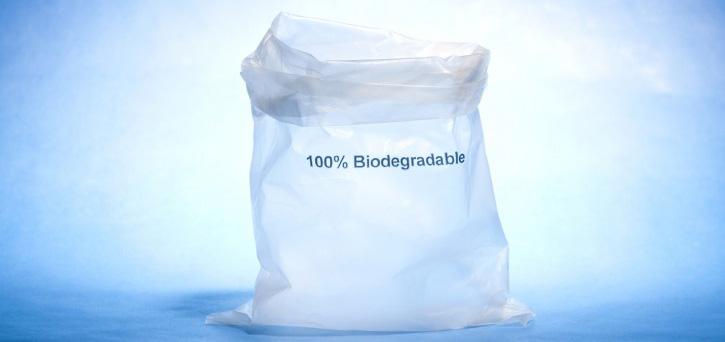Biodegradable items tend to break down into natural materials by the microorganisms without harming the environment. The examples of biodegradable items are food scraps, wood, cotton, human and animal waste.
Can plastic be biodegradable? Well, it sounds strange if this term is associated with something “eco-unfriendly” like plastic.
To your surprise, it is true. Plastic bags can be biodegradable. Biodegradable plastics are made of specialized enzymatic or chemicals that break down the material once exposed to sun and air. Standard plastic is made with chemical fillers that can be a threat to environment when they are released when the plastic is burnt.

U.S. Environmental Agency has alarmed that only 8% of the 31 million tons of plastic is recycled each year. The rest part goes to landfills and waterways, creating litter and threat to the wildlife.
In this scenario, biodegradable plastic bags can be a savior to the environment. Here’s how…
1. Less Carbon Emission:
Traditional plastic releases four tons of emissions while biodegradable plastics only emit nearly .8 tons of carbon. This way, they ensure the minimal amount of carbon emissions into the air in the process of manufacturing.
Also Read: Going Green is Not Easy: Top Green Packaging Challenges
2. Waste Reduction
Traditional plastics make up the 13 percent of the waste. As we have told you that only 9 percent go for recycling, while the rest enters water bodies and landfills. The good thing with biodegradable plastics is that it breaks down over the course of time, depending on its exposure to sunlight, soil and air. Although not all biodegradable plastic will completely break down, any reduction will create space and minimize the pressures on the waste fills. Therefore, biodegradable plastics may eliminate the need to add more landfills, saving lands for other purposes.
3. Recyclable:
Given that they take a lot less time to decompose than traditional plastics, they are easy to recycle, that’s too without releasing toxic elements. Another advantage of biodegradable plastic bags! They are moldable as traditional plastics and can be turned into various appealing ways to suit your requirements.
4. Source Reduction:
Biodegradable plastics also minimize the use of petroleum supplies. Nearly 2.7 percent of country’s petroleum is consumed by the manufacturing of traditional plastics. Their oil molecules are heated and treated so that they convert into polymers.
Biodegradable plastics, on the other hand, are manufactured using corn, orange peels, starch, plants and switchgrass. Their manufacturing requires less energy and generally not involves the burning of fossil fuels. The corn based plastics require 60 percent less energy than generating a similar polymer from raw petroleum. Many bags are also made from organic materials or paper.
More biodegradable plastics can be manufactured with less energy which also lowers the amount of pollution.
5. Non-Toxic:
It can’t be denied that traditional plastics are made using harmful by-products and chemicals which are a threat to environment and life as well. They are likely to emit these harmful substances during the breakdown process. But this is not a case with biodegradable plastic.
They are safe and don’t release toxins during their breakdown process. They are absorbed by the soil. Such benefits of biodegradable plastics are welcoming, as the toxic plastic heap on the planet is on the rise and this ever increasing rate will pose health problems for both human and wildlife.
Bottom Line:
So these are the benefits of using biodegradable plastic bags. They are safe for the environment and their use should be encouraged. However, the need of plastic usage awareness and education regarding their repurposing is necessary as the wise use can make a difference.





